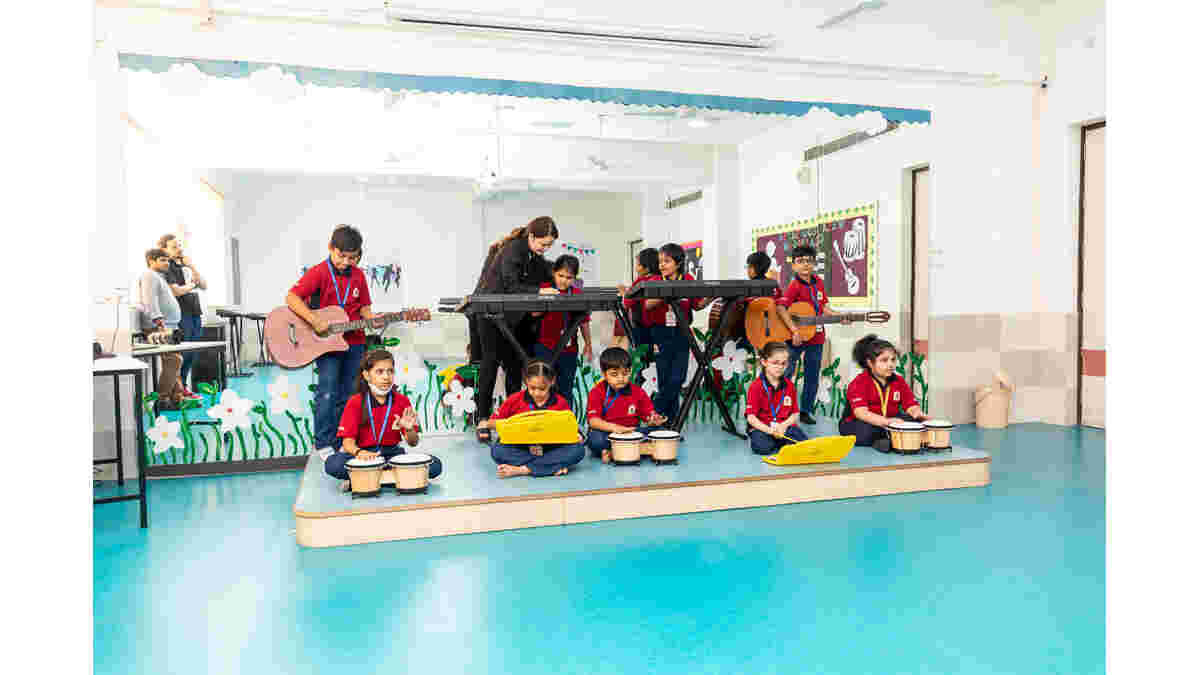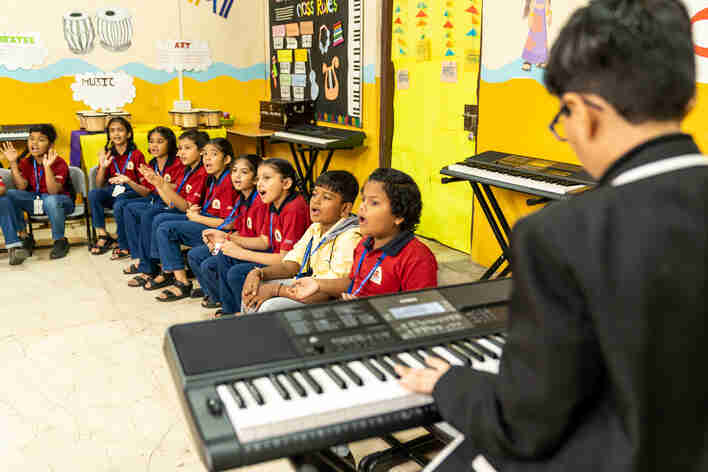Musical Instruments for Kids: All You Need to Know
By Harshitha |
Date 07-08-2024

Table of Contents
- Musical Instruments for Kids: All You Need to Know
- Benefits of Musical Instruments to Kids
- Best Musical Instruments for Kids
- Real Musical Instruments for Kids
- Tips for Introducing Musical Instruments to Kids
- Instrumental Music for Kids: The Power of Listening
- Musical Instruments Names for Kids
- Conclusion
- FAQ's
Admissions Open for
Musical Instruments for Kids: All You Need to Know
Music is part of human culture and development. Early exposure to playing musical instruments likely has some benefits associated with it, such as improving cognitive skills, creativity, and expression of emotions. This article explains what a parent or educator should know about the ideal musical instruments for kids.

Benefits of Musical Instruments to Kids
Cognitive Development
A musical instrument plays with multiple parts of the brain, developing memory, spatial reasoning, and problem-solving skills. Evidence has shown that children playing instruments often do better in their academics, especially in areas such as mathematics and language arts.
Emotional and Social Skills
Music is an excellent means of great emotional expression; hence, it helps children learn how to express and develop emotional intelligence together with empathy. Moreover, membership in groups or orchestras will enhance social skills because it teaches about teamwork, discipline, and cooperation.
Physical Coordination
Playing an instrument often engages fine motor skills and hand-eye coordination. For instance, instruments like the piano, guitar, violin, etc require correct movements of the fingers, which improves the dexterity and coordination of a child.
Creativity and Imagination
Music allows scope for creativity and imagination. From composition of original melodies to improvisation during a jamming session, the musical instruments help provide a channel for expressing oneself and innovating ideas.
Selecting the Right Kind of Musical Instrument for Children
However, choosing the right musical instrument for a child requires consideration of several factors, including the age, physical abilities, and interests of the child. Here are some of the best musical instruments for kids, categorized by age group.
Best Musical Instruments for Kids
By Age Group
Higher Musical Instruments for Toddlers (Ages 1-3)
Xylophone
The Xylophone is a great favorite with children of the toddler age. Colorful with simple keys, it is utilitarian in bringing out musical notes. Playing the xylophone may help develop hand-eye coordination and a basic grasp of the musical notes.
Shakers and Maracas
Shakers and maracas are great for a toddler to play with since they are simple and easy. These percussion instruments are really effective in developing a child's rhythm and timing, but are also easy and fun to play.
Tambourine
Another great instrument suitable for any toddler is the tambourine. Light in weight, easy to hold, the jingling sound produced when one shakes it is quite captivating to young children. Playing the tambourine can improve motor skills and coordination.
Age Appropriate Musical Instruments for Pre-schoolers
Ages 3-5
Piano/Keyboard
A small keyboard or even a piano is an excellent instrument that can be given to them during the preschool age. The instrument introduces the very basic concepts of music theory, such as notes, scales, and chords. It may also work on improving fine motor skills and cognitive development.
Ukulele
The ukulele is a fantastic, entry-level string instrument for young children compared to a guitar in size and manageability: perfect for fitting into a small child's hands. Playing this musical instrument will help in the growth of finger strength and dexterity.
Recorder
The recorder is one of the easiest wind instruments, and it is actually designed for pre-schoolers. It's really not that hard to play at all, but it does introduce the children to breath-controlled playing and some simple music notations. Because of this, recorders often feature in most initial school music curricula.
GMS Instruments for School-Age Children:
Age 6-12 Years
Guitar
The guitar is one of the popular instruments for any school-going child. It's versatile with styles one can play, and also it can be used to play many genres of music. Playing a guitar learner will develop hand-eye coordination, finger strength, and concentration.
Violin
Another great instrument for school-age children to learn is the violin. It is an instrument that includes precision and involves practice; thus, this can build up discipline and perseverance. Playing the violin also improves auditory skills and pitch recognition.
Drums
The drums are especially recommended for energetic children or those who love rhythm. Through playing drums, a person can acquire coordination timing and physical endurance. It provides an avenue for emotional expression and dispelling stress.
Musical Instruments for Teens Ages 13+
Saxophone
The saxophone is one of the favorite wind instruments among teenagers. It produces a rich and versatile sound applied in many diverse genres of music, from classic to jazz. Saxophone playing enhances breath control, lung capacity, and musical expression.
Keyboard/Synthesizer
If one is a teenager into modern music, the best instrument to study will be the keyboard or synthesizer. It allows for creativeness and a 'tinkering' aspect of different sounds and effects. Moreover, playing the keyboard will foster digital literacy and production skills in music.
Bass Guitar
The bass guitar is perfect for any teenager who enjoys playing bands. It gives roots of rhythm and harmony in so many various styles of music. It improves timing, coordination, and knowledge of theory.
Real Musical Instruments for Kids
Toy instruments can be fun, they can be educational, but real musical instruments offer a much more enriching experience. Here are some recommendations of real musical instruments that kids can play.
Casio SA-76 44-Key Mini Keyboard
The Casio SA-76 is the perfect first keyboard that young children should start playing music on. Some of the great features it has include 44 mini keys, 100 tones, and 50 rhythm patterns to play around with. It also features an easy and self-explanatory interface.
Mahalo Rainbow Series Soprano Ukulele Review
Then, there is the Mahalo Rainbow Series that comes with colorful Ukuleles, and they shall definitely turn out great for kids. They do not cost so much; are well-made and super easy to play. Therefore, the small size of the ukulele and the fact that it has soft nylon strings make it a perfect combination for any young musician.
Yamaha JR1 3/4-Size Acoustic Guitar
The Yamaha JR1 is a compact acoustic guitar for kids. Though small in size, it gives out full, rich sound and lives up to the high standards required in a full-sized Yamaha guitar. It's a fine instrument for kids serious about learning the guitar.
Mendini MV300 Solid Wood Violin
The Mendini MV300 is a great violin for beginners since it has varying sizes for children of different ages. It includes everything one needs to start playing straightaway, like a bow or rosin and hard case. Construction-wise, it is good, and it produces great sound quality for what you will be paying for.
Ludwig Junior Drum Set
The Ludwig Junior Drum Set is a full or regular drum set downsized for kids, which comes with a bass, snare, toms, cymbals, and everything in between. This is for kids serious about learning to play the drums.
Tips for Introducing Musical Instruments to Kids
Start Early
The younger, the better. Halten Music is good for even toddlers, so introduce them as early as possible. Start with simple instruments appropriate to their age, and then move on to the more complex ones later in their development.
Soccer Games Online Make It Fun
Do not burden them with the stress of a learning chore. Allow them to play around with instruments and the sounds they can make without forcing formal lessons early on. You can enjoy some fun activities like games that deal with music and sing a longs; before long, interest will be developed.
Be Patient and Supportive
Learning to play an instrument takes a long period of time and practice. Be patient and encouraging. Recognize small accomplishments and progress to keep their interest level high.
Take Music Lessons
You may be interested in enrolling your child with a music teacher or instructor who can effectively guide your child in the music field. Professional lessons provide well-structured learning, individual guidance, and exposure to complex techniques and theory.
Encourage Practice
To master any musical instrument, regular practice is incumbent. Devise a regular practice schedule and an conducive environment for your child to practice in. Ensure that the practice sessions are regular but not overwhelming.
Attend Live Music Events
Exposure to live music can be very inspiring for your child. Concerts, recitals, and other such events may inspire them besides being great exposure to different styles and instruments of music.
Instrumental Music for Kids: The Power of Listening
It can also affect instrumental music on children's development. Instrumental music will help improve focus, reduce stress, and boost creativity. Following are some of the recommended instrumental music pieces and genres for kids.
Classical Music
Classical music has its own calming effect and is intellectually rich. Composers like Mozart, Beethoven, and Bach are able to provide relaxing yet stimulating music for children.
Jazz
Harmonies and improvisation in jazz music are rich and can enable children to be introduced to more sophisticated musical structures and rhythms. Some great starting points would have to be Louis Armstrong and Duke Ellington.
World Music
Introduce your child to world music. Instruments and styles from around the world can grow their musical horizons and appreciation for diversity.
Film Scores
Many children's movies have beautiful instrumental scores. This can be fun, and tracking it will be musically enriching, too. Listened to soundtracks of movies like "The Lion King," "Frozen," and "Harry Potter."
Musical Instruments Names for Kids
Getting the child familiar with the names of various instruments will generate curiosity and interest in learning to play. Here are the common musical instruments for kids
Piano
Guitar
Violin
Ukulele
Recorder
Flute
Saxophone
Drums
Xylophone
Tambourine
Maracas
Trumpet
Cello
Clarinet
Harp
Conclusion
There are teething, long-term benefits the child derives from being introduced to musical instruments. From medicine bottles filled with beads and rice to xylophones for the little ones, or from violins to saxophones for older teens, there is a whole array of instruments available to suit every age group. Cultivating a taste in music in the very tender early years can set the base for a full lifetime of enjoyment and personal growth. From formal lessons to casual play, real musical instruments for children can supply a steeping experience which will flavor their futures profoundly.
Given the proper instrument, a supportive environment, and the stimulation of regular practice, instrumental music can be used to unlock many benefits for the child by parents and educators.
FAQ's
What is the easiest musical instrument for a child to learn?
The recorder is often considered the easiest due to its simple fingering system and ease of producing sound.
What musical instrument should a child start with?
A child can start with the ukulele because of its small size, soft nylon strings, and easy-to-learn basic chords.
What is the best instrument for a 4-year-old?
The xylophone is ideal for a 4-year-old, offering colorful, easy-to-play keys that help develop basic rhythm and melody skills.
What are the top 10 easiest instruments?
-
Recorder
-
Ukulele
-
Xylophone
-
Hand percussion instruments (shakers, tambourines, maracas)
-
Piano/Keyboard
-
Harmonica
-
Bongos
-
Glockenspiel
-
Kazoo
-
Triangle
Liked what you read? Feel free to share this article with your friends and spread the knowledge!
Related blogs
At What Age Should Kids Start Learning Music: Find the best age for children to start music lessons.
Importance of Arts for children: Learn why arts education is essential for children.
Importance of Music for Kids: Uncover the crucial role of music in children's development.
CBSE Schools In Popular Cities
- CBSE Schools in Bangalore
- CBSE Schools in Mumbai
- CBSE Schools in Pune
- CBSE Schools in Hyderabad
- CBSE Schools in Chennai
- CBSE Schools in Gurgaon
- CBSE Schools in Kolkata
- CBSE Schools in Indore
- CBSE Schools in Sonipat
- CBSE Schools in Delhi
- CBSE Schools in Rohtak
- CBSE Schools in Bhopal
- CBSE Schools in Aurangabad
- CBSE Schools in Jabalpur
- CBSE Schools in Jaipur
- CBSE Schools in Jodhpur
- CBSE Schools in Nagpur
- CBSE Schools in Ahmednagar
- CBSE School In Tumkur

Call Us to know more about Orchids
Swipe Up



.jpg&w=1920&q=80)












